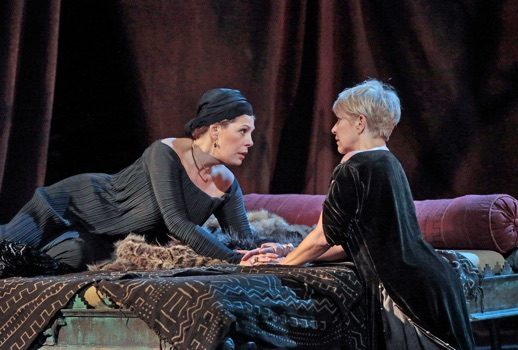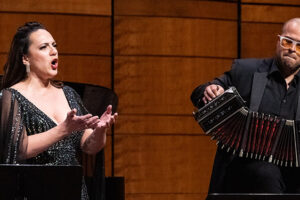

“Is this what they call a ‘textured’ performance?”
A gnawing sense of déja vu kept invading my thoughts during the second half of Bellini’s Norma Monday evening: I was reminded of the Met’s Opening Night two years ago when the audience got a new dark, dull Otello that didn’t at all improve on the production it was replacing.
As it does with Bartlett Sher who directed the Verdi, the house inexplicably returns again and again to Sir David McVicar; Norma was his seventh lackluster Met production in eight years, a possible eighth—Puccini’s Tosca—opens on New Year’s Eve and there’s at least one more is in the pipeline. Despite the best efforts of Sondra Radvanovsky and Carlo Rizzi, Bellini’s masterpiece under his “guidance” gallingly fizzled rather than flamed.
One searched in vain for a distinctive directorial point of view on the travails of a woman who is clearly having trouble balancing her public and private lives. Unfortunately, McVicar frequently undercut Norma’s role as priestess; at her entrance she immediately rolled onto her back with arms outstretched (to the moon?) on a platform lodged in a massive tree that dominated a tableau that reminded some of either the old Met Rusalka or its new Falstaff.
She delivered her scorching initial recitative and the first verse of “Casta diva” while kneeling and only rose to her feet for the second; then for much of the repeat of its cabaletta she cowered in an odd crawlspace under the platform.
During the alternately vehement and regretful final scene, Norma in a flat, bad perm declared war and then embraced immolation while barefoot in a shapeless black off-the-shoulder frock—hardly what one imagines for one of opera’s grandest heroines. But Adalgisa, her nemesis/boon-companion, had it even worse: she mostly stumbled around in Moritz Junge’s anonymous sackcloth garment which provocatively bared even more shoulder— was this standard dress for the local vestal virgins?
If any aspect of McVicar’s production could be termed revisionist it was his view of Adalgisa who was initially seen as Norma’s brightly-lit deacon handing her the sickle with which she sliced off the mistletoe branch. Once in private the junior priestess became a quivering, guilt-ridden mess who delivered her prayer on her stomach flat on the ground.
In fact Adalgisa figured prominently in one of the worst facets of McVicar’s production: his bizarre tendency to create movements that cruelly distracted from the principal action. After the public rite as Norma wished for Pollione’s return in “Ah bello a me ritorna,” Adalgisa prostrated herself in prayer at the front of the other side of the stage. While the two women bonded in “Mira o Norma” Clotilde fussed with the two children directly behind them.
Throughout the sublime “Qual cor tradisti” in the final scene, burly extras methodically carried in planks to be used for the pyre in the upcoming conflagration. When Norma and Pollione walked toward an unfrightening fire leftover from a budget tour of Die Walküre, all eyes instead trained on Adalgisa who entered to kneel in anguished prayer yet again. Admittedly Norma can be a very static work, but last night even when there were no distractions, the blocking had little focus or intensity. In the explosive ensemble that ends the first act, the three performers just blandly crisscrossed the stage to little effect.
That Radvanovsky proved to be a notable Norma was all the more impressive as the production often hindered rather than helped her. She has clearly continued to work hard on the role since her first promising Met appearances in 2013. Her involvement in the Donizetti Tudor Queen trilogy two seasons ago perhaps showcased her growing bel canto credentials more persuasively than this Norma however.
Initially best known for her ringing if harsh power she now sings with more care and nuance, yet on many occasions when she fined down her tone to the merest thread of a pianissimo it came across as an “effect” rather than something that arose organically from the vocal line.
The opening “Sediziose voci” was forthrightly declaimed and “Casta diva” finely spun although she and Rizzi weren’t always in agreement during the final pages which in any case rarely come together as smoothly as one would like. The cabaletta unfortunately proved screamy and effortful, the awkward ornaments subtracting rather than adding to the piece’s urgency.
The first duet with Adalgisa however found her in better form, dreamy and sympathetic, but Pollione’s appearance revealed the flaws in her florid singing with “Oh non tremare” marred by smudged coloratura. Things got a bit hectic in the subsequent finale but she capped it with a brief but blazing high D.
The crucial recitative at the beginning of the second act was intelligently done although the consistently unilluminating lighting by Paule Constable failed to reveal the important stage business with the knife at the altar/utensil drawer at the forward right corner of Norma’s impressively large timbered yurt. Radvanovsky’s finest singing came in the final scene although the demanding opening pages of the “In mia mano” duet taxed her lower register and those thrilling rising trills in “Adalgisa fia punita” were blurs.
However, she pled both “Qual cor tradisti” and “Deh! Non volerli vittime” gorgeously with the pianissimi at last finely integrated into the vocal line. She demonstrated impressive pacing and stamina sounding nearly as fresh at the end as in the opening moments.
One of the greatest improvements since the 2013 performances revealed itself in Radvanovsky’s marked investment in Romani’s text. Many times in the past one saluted her vocal achievements while bemoaning her apparent lack of interest in the words she was singing. While occasionally one wanted still crisper, more incisive diction, she demonstrated enormous advances particularly in the many crucial recitatives.
If, in the long run, she may have lacked the ideal gravitas of the greatest Normas, but I imagine few in the audience were regretting Anna Netrebko’s withdrawal as surely the Russian diva’s agreeing to take on the role was the original raison d’être for this production.
Joseph Calleja has never been a compelling stage presence but his Pollione was even more stiff and aloof than may have been intended. His preening demeanor in the opening scena did little to endear one to this serial seducer. The callously brutal “seduction” of Adalgisa did illuminate his feckless disregard for the women in his life. Pollione’s turn-around in the opera’s final moments has always been pretty hard to swallow but Calleja’s stolid acting didn’t help.
That said, his trademark idiosyncratic tenor generally rang out with confidence and occasional attention to softer dynamics though he nearly came to grief in his cabaletta which was (fortunately?) shorn of its repeat. He also dropped out for a surprising number of measures before his weak final high note concluded that scene.
I usually just want Oroveso’s music to be over, but Matthew Rose, the youngest of the four principals, made something interesting of the Druid chief’s music which opens the first and final scenes of the opera. Not having the rounded rotund bass sound that one often gets in the role, he instead brought an appealingly youthful vigor to his stern pronouncements yet melted accordingly to Norma’s irresistible pleadings. Adam Diegel’s sour and strained Flavio was not an asset but Michelle Bradley’s sumptuous, sympathetic Clotilde grabbed one’s attention at her every appearance.
Enacting McVicar’s wildly neurasthenic Adalgisa with unwavering commitment, DiDonato was nonetheless cruelly miscast. If many passages exhibited a noble, sculpted beauty, the top of the voice has become increasingly unreliable and any excursion to the top of the staff or above was tight, white and usually sharp. She ducked the high C in the first duet with a finessed alternative that still went awry and even with “Mira o Norma’ down a whole tone it strained her badly turning one of the work’s sure-fire high points into a disappointing misfire.
Rizzi who had conducted the premiere of the previous Met production in 2001 returned with a vigorous and expansive reading. After an understandably unidiomatic (but protest-less) National Anthem, his splendidly alert “Sinfonia” got the evening off to a promising if very late start. My biggest reservation was an extremely slow rendition of the first Norma-Adalgisa duet that nearly fell apart.
He was vividly seconded by Donald Palumbo’s fine chorus in fiery, brazen form for the war-mongering but which coped less successfully with more prayerful moments. The laughable galumphing about by a group of “dancers” particularly in the final scene was presumably the responsibility of “Movement Director” Leah Hausman.
Norma was an early enthusiasm of mine but now has become an opera I respect more than love. The near superhuman demands of the title role which were finely examined in a recent piece in The New York Times by Parterre’s own James Jorden suggest that an entirely satisfying performance of the opera might be a near-impossibility.
So if Radvanovsky fell short in some ways, it was still a valiant often successful portrayal. McVicar’s impersonal, insight-free production must bear much of the blame that the cumulative effect of this new Norma was far from the catharsis of “pity and fear” Bellini and Romani surely intended.
Radvanovsky sings just four more performances including an HD transmission on October 7th and viewers will no doubt make up their own minds as to how she stacks up with past greats. I, for one, am curious as to how other singers this season will fare in the two crucial female roles—next up, Marina Rebeka followed by Angela Meade as Norma with Jamie Barton as Adalgisa.
Photo: Ken Howard/Metropolitan Opera























Comments